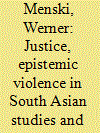|
|
|
Sort Order |
|
|
|
Items / Page
|
|
|
|
|
|
|
| Srl | Item |
| 1 |
ID:
170668


|
|
|
|
|
| Summary/Abstract |
This issue of South Asia Research (SAR) marks and celebrates 40 years of an academic venture that began in very different conditions than one faces in publishing today. Initially, it was quite a modest in-house product, with the first issue of this journal published in May 1981. The decision at SOAS in 1980 to establish a journal run by doctoral students involved a team including the historian Rosalind O’Hanlon, now Professor of Indian History and Culture at Oxford, the historian Vanessa Harvey-Samuel and the anthropologist Catherine Thompson. The moment of taking the initiative to use print to stimulate progress, academically as well as personally, matches remarkably well with the research focus of many South Asianists on the role of the printing press. It appears in the work of O’Hanlon herself on Marathi sources and is still present in recent studies that illustrate, for example, how a Tamil religious leader and his followers ‘used print as a tool to garner religious and textual authority’ (Weiss, 2019: 52). Seen in this light, the creation and production of SAR was a landmark event in the development of South Asian Studies not just at SOAS but globally. Forty years later we are, indeed, a truly global journal, respected (and cited) worldwide.
|
|
|
|
|
|
|
|
|
|
|
|
|
|
|
|
| 2 |
ID:
148511


|
|
|
|
|
| Summary/Abstract |
This editorial article covers much more than Dalits and untouchability, because ‘caste’ itself is about life, similar to the inevitably related human constructs of ‘law’, ‘religion’, ‘society’, ‘culture’ and also ‘race’ and ‘gender’. This article and the contributions in this Special Issue will not resolve the ongoing turbulences over caste, but may be useful tools to identify avenues for more constructive debates, rather than acrimonious exchanges. The key argument of the present article is that while difference is part of the human experience everywhere, ‘caste’, however disagreeable, remains an ancient culture-specific component of the intensely plural current identity of South Asia and South Asians, wherever they may be in the world today. It seems impossible to deny, ban or abolish this entity, which continues to serve as an identity marker, often in efforts to resist ongoing discriminations. Academic debates thus need to develop more constructive and sophisticated methods in various current attempts to acknowledge the multivocal stances on ‘caste’ and to negotiate better justice rather than falling into traps of all kinds of phobias, old and new. Approaches which simply deny that caste still exists, posit that it can just be abolished or claim that it cannot ever be adequately debated are unhelpful and just increase the heat in existing chaotic and largely self-righteous discourses. The article suggests that ancient Indians seem to have known much more about diversity management than we care to admit, while messiness and chaos remain prominent all around us today. This is not idolising a glorious past, but critiquing the present chaos while searching for justice-conscious remedies in diversity management.
|
|
|
|
|
|
|
|
|
|
|
|
|
|
|
|
|
|
|
|
|